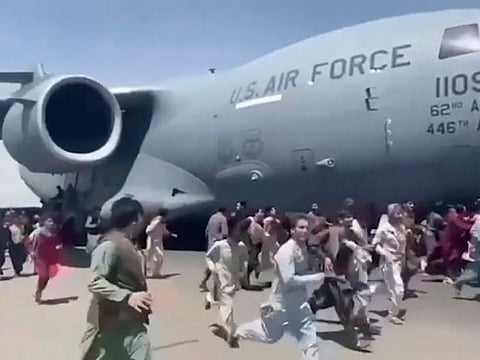Afghan refugee crisis must be averted
Taliban need to be more reassuring — they must put their words into action

There are images that become part of history, capturing a moment and shaping the thoughts of millions. And the image of two men falling from a US C-17 military transport plane as it took off from Kabul airport this week will now be forever seared in our collective psyche.
Just like the unfortunate man who jumped from one of the burning Twin Towers on 9/11 against the backdrop of faceless skyscrapers or a young burnt girl fleeing in pain from a napalm attack in Vietnam, the image of two Afghans falling from the sky should move us. And move us to action.
The Taliban are now in control in Afghanistan. But what is unfolding now is a humanitarian crisis above all else.
As per the United Nations’ refugee agency (UNHCR), close to 400,000 Afghans have been forced to flee their homes since the beginning of the year.
Relief organisations have pointed at the hardships faced by Afghan refugees, noting that as many as 30,000 people are leaving the country every week even as Taliban move with a dazzling speed to consolidate power and complete a spectacular takeover of the country.
Aid agencies find themselves ill-prepared to help thousands of people displaced by the evolving situation.
Refugee crisis
Neighbouring Pakistan already hosts 3 million Afghan refugees since the Soviet Union’s invasion of Afghanistan in 1979 and subsequent waves of violence and later a civil war. There is palpable nervousness in the European Union too, which is still reeling under the 2016 migration crisis.
On the Afghan migration crisis, Chancellor Angela Merkel, recently told media that the problem cannot be solved by “taking more people in”. Turkish authorities too are wary, monitoring any fresh influx of migrants from Afghanistan. US has set up an emergency fund to meet “unexpected urgent” Afghan refugee needs and is attempting to evacuate special immigration visa applicants.
Many are betting on the fresh approach adopted by Taliban. While the new rulers say they will grant amnesty to all those who may have worked with foreign forces there over the past two decades, we can only take them at their word.
For tens of thousands of Afghans, who have fled the violence, who have no home to return to, it is an uncertain future. They cannot be allowed to turn into another tide of human detritus.
In this unprecedented situation, the international community must extend as much help and refuge to the people of Afghanistan as possible. The Taliban must put their words into action. Only then, a peaceful, prosperous Afghanistan is possible.








